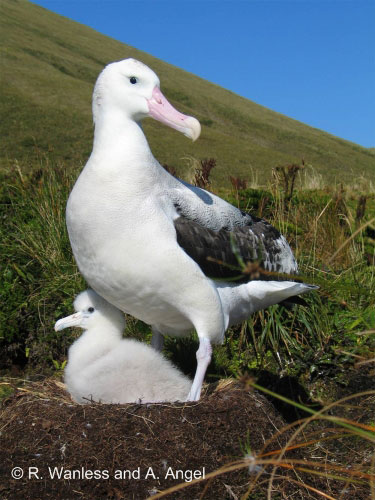The Tristan da Cunha islands, which include the Gough and Inaccessible Islands World Heritage Site, form part of a United Kingdom Overseas Territory in the South Atlantic. The islands have been in the news this year because of the Oliva oiling disaster at Nightingale Island which killed thousands of Northern Rockhopper Penguins Eudyptes chrysocome from oiling and led to a major rehabilitation attempt (click here).
The UK ratification of the Albatross and Petrel Agreement was extended to Tristan da Cunha in April 2006, after the adoption of new conservation legislation by Tristan which takes account of the text and requirements of the Agreement. The island group is home to six species of breeding ACAP-listed albatrosses and petrels, and a further six non-breeding visitors. Three of the breeding species, the Critically Endangered Tristan Albatross Diomedea dabbenena, the Endangered Atlantic Yellow-nosed Albatross Thalassarche chlororhynchos and the Vulnerable Spectacled Petrel Procellaria conspicillata, are all endemic to the group. The remaining breeding ACAP species are the Endangered Sooty Albatross Phoebetria fusca, Southern Giant Petrel Macronectes giganteus and Near Threatened Grey Petrel P. cinerea.

The single commercial fishery within Tristan territorial waters, for Tristan Rock Lobster Jasus tristani, achieved certification with the Marine Stewardship Council last month (click here). Tristan Rock Lobsters are found almost exclusively within the territory and the island community relies heavily upon the fishery as the main source of revenue for its resident population of 264 people (click here). The annual catch was 435 tonnes in the 2008/09 season and is currently sold mainly to markets in Japan and the USA.
Cape Town fishing company Ovenstone Agencies is the sole concession holder for the fishery. Fishing at the three outer islands of Gough, Inaccessible and Nightingale is conducted by Ovenstone's freezer factory vessel, the m.v. Edinburgh and her four dories, which fish using bottom-set traps. Fishing at the main island of Tristan is conducted by Tristan Islanders using nine dories with both hoop nets and smaller traps. The fishery is managed by the Tristan da Cunha Fisheries Department, which sets an annual catch quota for each individual island in the group, taking into account scientific advice from South Africa's University of Cape Town.
During a certification workshop held in Cape Town in 2010, the ACAP Information Officer contributed to the discussion, advising on ways to reduce mortality of seabirds attracted by working lights to the fishing vessel at night. As a consequence of this and of other inputs, the fishery may now be regarded as a "seabird friendly one" and mortality of ACAP-listed species is not expected to be a concern.
Another Southern Ocean fishery, the Heard and McDonald Islands Mackerel Icefish Champsocephalus gunnari trawl fishery, was recertified by the MSC last month (click here). Several other Southern Ocean fisheries that impact with (or have the potential to impact with) ACAP-listed albatrosses and petrels have been certified by the Marine Stewardship Council or are in the process of certification (click here and follow the links).
References:
Ryan, P.G. 1991. The impact of the commercial lobster fishery on seabirds at the Tristan da Cunha Islands, South Atlantic Ocean. Biological Conservation 57: 339-350.
Wolfaardt A.C, Glass, J.[P] & Glass, T. 2009. Tristan da Cunha Implementation Plan for the Agreement on the Conservation of Albatrosses and Petrels (ACAP): Review of Current Work and a Prioritised Work Programme for the Future. Edinburgh, Tristan da Cunha: Tristan da Cunha Government. 46 pp.
John Cooper, ACAP Information Officer, 25 July 2011

 Español
Español  English
English  Français
Français